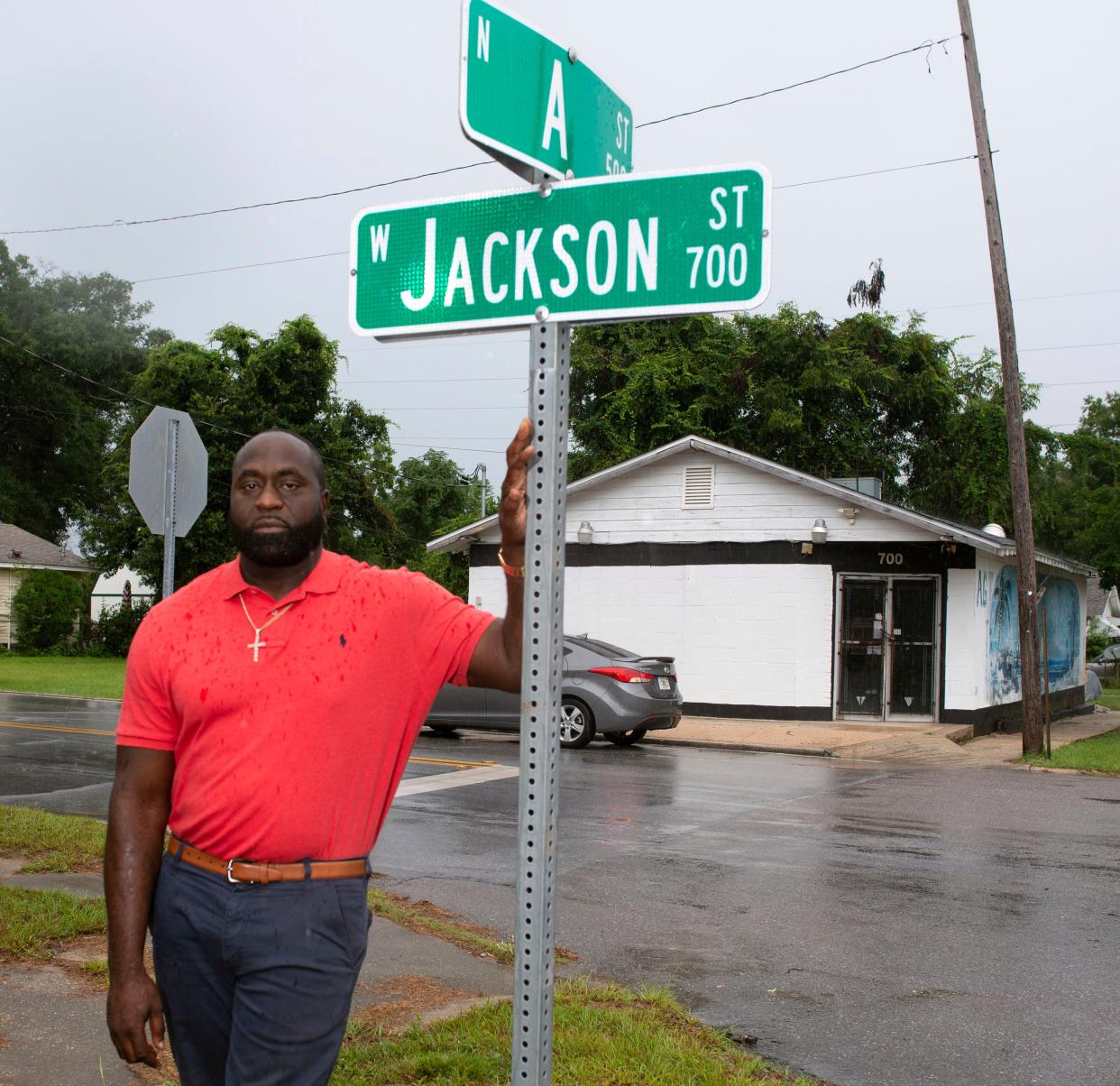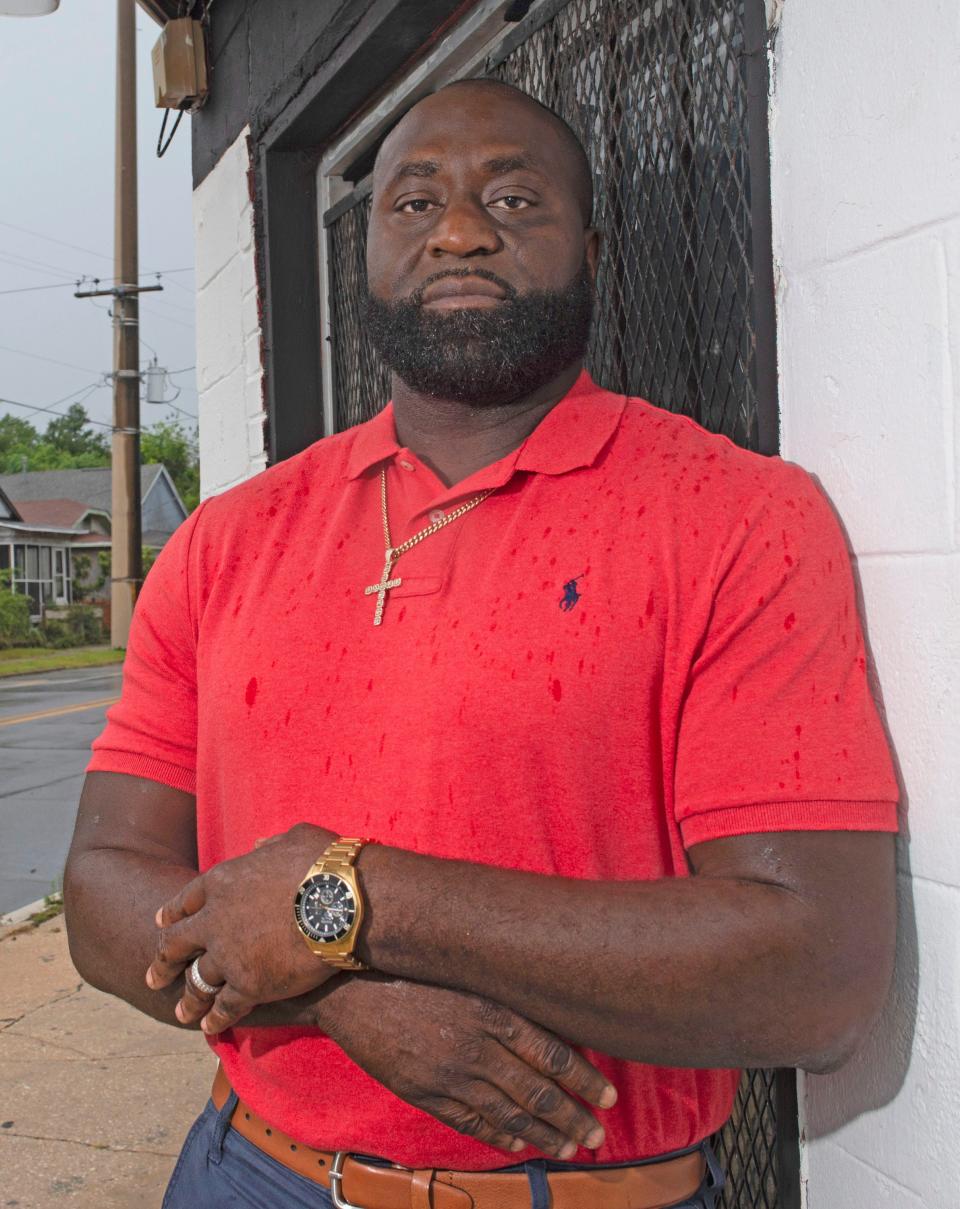As a drug dealer, he destroyed communities. Now, this Pensacola man is building them up.

Back in the day, Chip Simmons and Hassan Hills had something of a professional acquaintanceship.
Simmons was a young police officer and Hills was a teenage drug dealer. The way they saw it, they each had a job to do, and over the years, their trades caused them to cross paths several times.
Simmons either investigated or arrested Hills on multiple occasions and was part of the federal narcotics task force that helped put Hills in prison on charges related to conspiring to possess powdered cocaine and crack cocaine and close to 200 pounds of marijuana.
But when Hills was released from federal custody last year, Simmons was one of the first people he called. And Simmons, now the Escambia County sheriff, did more than just answer the call.
Simmons agreed to help Hills achieve his new calling — to strengthen the communities he had harmed by distributing drugs as a young man.
Less than two years after leaving federal custody, Hills has founded the new Pensacola-based nonprofit Youths Left Behind Corp., aimed at providing mentorship and guidance to children with incarcerated parents.
"He feels like he owes the community a debt, and he has set out to repay that debt," Simmons said. "I'm glad to be able to help him in any way that I can, and I'm just super proud of him."
Drugs, cops and drug cops

Mentor program: New Sheriff's Blazer Academy aims to help Escambia County boys grow into good men
Community policing: Will fixing potholes and streetlights reduce crime? ECSO's new program hopes so
Hills, 42, knows firsthand what it is to have an absentee parent. His mom suffered from addiction at the height of the 1980s crack epidemic when she and her children were still living in Camden, New Jersey. When she was arrested, Hills and his siblings were nearly separated from each other by the state.
But Hills' mom was eventually released from prison into New Jersey's Intensive Supervision Program and moved her family to Pensacola in 1992 for a fresh start.
She had a hard time finding work in Florida with her criminal record, forcing her and her children to live off $364 of welfare per month.
"Unfortunately due to our financial situation, I started selling crack," Hills said.
Hills said he sold his first crack rock on the corner of A and Jackson streets in Pensacola at the age of 14.
"I had to do what I had to do in order to put food on the table and provide for me and my family," he said. "What started off as just something to provide for my family led to a heart of greed, and I got addicted. ... What most people don't understand is that it's an addiction. The money, the fame, the adrenaline that you get, it's an addiction."
It was around that time that he first met the future sheriff.
Simmons began his decades-long career as a Pensacola police officer before a series of promotions ended in him being named the city's chief of police and later being elected sheriff of Escambia County in 2020.
Hills and Simmons crossed paths when they were both out on the street. Sometimes Simmons was there to make an arrest, sometimes not.
"We had a lot of conversations. You have to understand, there were many times that we would interact when he wasn't arrested," Simmons said. "We stopped, and we talked to them. We kind of knew what he was up to, and they knew that we were doing our job. As long as you don't mistreat people and you do the job for the right reason, then I think there's a level of respect there, at least."
Hills' first juvenile case was for sale and delivery, a felony offense he picked up from selling crack to a confidential informant.
"I got arrested, sent to jail, got back out, got caught with some more crack, went back to jail," Hills said.
Hills also climbed the ranks quickly, and at age 17, he was dealing in large quantities of narcotics coming in from out of town.
"By the time I was 20 years old, I was hit with a federal indictment," he said.
A federal motion filed by Hills' defense attorney, Randall Lockhart, stated, "At sentencing the Court found that Mr. Hills was responsible for 20.25 kilograms of powder cocaine and 196 pounds of marijuana; the powder cocaine was converted to crack cocaine using a 'multiplier,' because it was the 'practice' of the co-defendants in the conspiracy 'to sell cocaine base,' and this resulted in Mr. Hills being held responsible for 16.2 kilograms of crack cocaine and 88.90 kilograms of marijuana."
Hills was found guilty and had two prior felonies. Due to a federal enhancement code, Hills was sentenced to life in prison Dec. 19, 2001.
'Matured' from old behaviors
Twenty years later, Simmons recognized the name when an aide told him there was a phone call from one "Hassan Hills."
"I recognize the name because, again, he was a pretty big target for us back in the day," Simmons said, adding he took the call because "I never really thought that he would be angry or violent ... and I was curious as to what he wanted."
Hills never thought he would get out of prison. But he caught a break with what seemed to him like a series of incredibly "fortunate" events.
First, federal sentencing measures changed between 2001 and 2021, removing the type of mandated life sentence Hills originally received for having three nonviolent, drug-related felony convictions.
Then Hills was named as one of the 330 people former President Barak Obama commuted on his last day in the White House, which reduced his sentence from life in prison to 30 years in prison with credit for time served.
And when former President Donald Trump in 2019 signed revised provisions within the Fair Sentencing Act into law, Hills had the opportunity to apply for the benefits. He did, and his motion for an earlier release was granted.
In an order for release, Senior U.S. District Judge Lacey A. Collier noted that although Hills' disciplinary record in prison showed "several infractions," his record had been clean since 2013, suggesting that "he has matured away from the sort of behavior that landed him in prison."
Hills was released Feb. 5, 2021.
"Out of all of the thousands of people in federal prison, I made it out and I always told myself that if I ever got out, I will come back to the communities that I once destroyed and try to build them from within by working with our young people," Hills said.
Hills had big ideas about how he wanted to mentor young people but knew he needed guidance on how to accomplish it.
"When I found out that (Simmons) had made sheriff, I had just came home," Hills said. "I was saying to myself, 'Well, this is what I want to do.' Then I wondered if Sheriff Chip Simmons would talk to me?"
Simmons invited Hills to his office and after listening to the recent releasee about his goals, the sheriff said, "Hassan Hills, I believe in you."
It meant a lot to Hills.
"A person of my background, of what I've been through, doesn't really stand a chance — a convicted felon, been in the prisons, drug dealer, served 20 years," Hills later recalled. "To get out and to hear that from somebody we put in office — that they 'believed in me' — that's all I needed to know that I can make a difference within the city of Pensacola, within the state of Florida, within the United States. Those four words, they motivated me to move. This is why I'm where I'm at now."
Putting in the work
Speaking to him these days, there's no sign of Hills' troubled past, just determination and sincerity as he discusses what he wants for the youth of Pensacola.
The federal government had pronounced him rehabilitated, and Hills believes he's reformed himself into a better man than the person he was as an adolescent.
After speaking with Simmons, Hills began volunteering at AMIkids Pensacola – Escambia Boys Base, a moderate-risk residential halfway house at Corry Station that provides young men mental health services, vocational and academic training and mentoring.
"I myself was in the juvenile facility growing up, and when I went there, I saw the eyes of the children, the need for some mentorship," Hills said.
He started a "mentorship session" at the organization that takes place every Sunday from 6 to 8:30 p.m.
The sessions are meant to be a relaxed setting in which Hills can tell the boys about his own experiences and help them to consider topics such as where they'd like to be in three to five years.
"Most people don't realize that they live right now solely based on decisions they made three to five years ago," Hills said.
The group also discusses issues like peer pressure.
"And then, we talk about what they have learned from their past mistakes," Hills said.
The sessions are completely voluntary. Only eight boys attended when Hills first started. The sessions now regularly draw more than 20 boys.
Once a month, Hills spends an entire Saturday in DeFuniak Springs speaking with the teenagers in custody at the Academy of Growth and Development, a facility that houses a secure residential treatment program.
Hill said he mentors 15 boys "from the inner city," unassociated with either of the Department of Juvenile Justice facilities, on weekly basis. Last week, he drove two of them to the Escambia County Tax Collector's Office to get their first driver's licenses.
Hills refers to his mentoring curriculum and teaching style as one that continues develop "peer group empowerment."
"Our objective at Youths Left Behind is to aid and assist youth who've been affected by a parent, guardian or loved one caught up in the system of mass incarceration, drug addiction and to provide comprehensive mentorship," Hills said.
His ultimate aim is to afford a brick-and-mortar location for his nonprofit that will be located close to the low-income neighborhoods where he once dealt drugs to provide walkable or bikeable access for kids who live there now.
Eventually, he hopes to enter into negotiations with state and federal agencies and set up computers in the nonprofit's space where children can use Skype or Zoom to speak to their incarcerated parents.
"Anytime you separate a child from their parents for long periods of time, whether it's the parents' wrongdoing or whatever, it has a mental effect," Hills said.
Recently, Hills has started to attend and bring some of his mentees to the Escambia County Sheriff's Office for the Sheriff's Blazer Academy, where both Hills and Simmons spoke before a small crowd of attendees together.
"People really listen whenever he speaks," Simmons said.
Simmons and Hills have additionally spoken together at the Boys Base.
It's something of a professional acquaintanceship, only now both men have a similar job: working to make the community better and safer.
"If you'd have told me 20-something years ago that we'd be sharing a stage together, talking about the evils of drug trafficking, I would've said, 'You're crazy,'" Simmons said.
Colin Warren-Hicks can be reached at colinwarrenhicks@pnj.com or 850-435-8680.
This article originally appeared on Pensacola News Journal: Ex-Pensacola drug dealer starts Youths Left Behind Corp. to help kids

